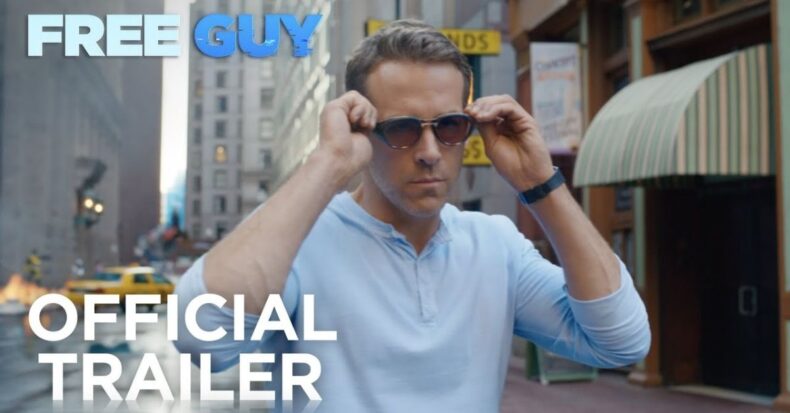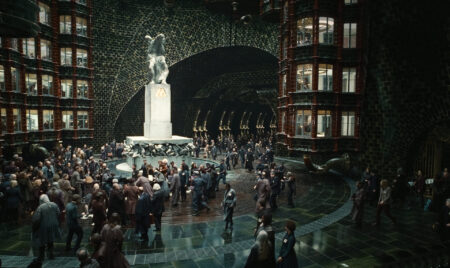Free Guy’s activity starts decisively as the nominal everyman (Ryan Reynolds) begins his day in Free City, a computer game heaven of audacious culpability.
Yet, Guy isn’t one of ‘the shades individuals’, who can annihilate, take and complimentary lift around the town at whatever point they please. No, he’s an NPC (Non-Player Character), so he is reviled – or in his eyes favoured – to rehash his days again and again.
He wears a similar garment, drinks a similar espresso, and works in a similar Bank each day. This roundabout presence is flipped around, be that as it may, with the appearance of gamer MolotovGirl (Jodie Comer), an occasion which makes Guy question his whole presence.
The set-up for the film is perfectly done, and this present reality story is very savvy. Away from Free City, software engineers and previous dearest companions Millie (Comer’s genuine person) and Keys (Stranger Things’ Joe Keery) planned a computer game world intended to develop naturally and iteratively.
Indeed, it was a likely hatchery for Artificial Intelligence before it was gained by the corporate designer ‘Soonami‘. While Keys remained to work for the partnership, Millie headed out in a different direction, frantic to demonstrate that something more accursed was affecting everything.
The explanation of this storyline – in which Keys and Millie start to revive their companionship – works extensively because of both Comer and Keery themselves.
They are astounding in jobs which could, in different hands, have felt slender. Comer can hop between the created Villanelle-Esque MolotovGirl and her more dubious genuine world persona easily, and all through, she has a characteristic, guaranteed screen presence.
Keery, as well, carries a deft equilibrium to his person by never exaggerating his scenes. Though some animation exhibitions around them (ahem, Taika Waititi), the pair are refreshingly authentic.
However, a unique thought, it might be said, Free Guy is massively subsidiary. Indeed, Free City is a knowing tribute to universes like Fortnite, Grand Theft Auto and Saints Row.
However, visually, it inclines vigorously into different works. Regardless of whether it’s the Groundhog Day meets The Truman Show set up or a finale that is beat for beat suggestive of the likewise subordinate Ready Player One, it doesn’t attempt to kick off something new.
In reality, it doesn’t feel 1,000,000 apparent miles from one of Reynold’s past activity undertakings, the completely pleasant Detective Pikachu.

Additionally, underneath the sweetness of CGI blasts and full-scale activity, Free Guy has a jumbled perspective indeed. It pitches Antoine (a very enthusiastic and unpleasant Taika Waititi) as the film’s fundamental scalawag because of his hardhearted quest for cash.
He’s the genuinely very much worn generalization of a corporate peddler who couldn’t care less about individuals and will produce continuation upon spin-off of harden his licensed innovation (IP), rather than making something new.
It is a severe and intense assertion for the Disney organization to make, and, astonishingly, the film attempts to have it both ways.
At the point when Guy goes head to head against ‘Man’, he can get back to Disney’s complete index of pre-cherished IP to incite a few giggles.
The roll-call of honestly unique and fun appearances implies portions of the film are close to the activity in imaginative piggybacking. However, Millie, Keys and even Guy are battling for inventiveness and artistic liberty; the actual movie is peculiarly stitched in.
When taken on face esteem, Free Guy is verifiably muscular, on occasion a very creative summer blockbuster that utilizes its cast well. Reynolds is the ideal decision for Guy – the guileless yet good-natured foundation character who gradually discovers his motivation – and the content follows through on a couple of all-around made giggles.
In any case, in its energy, Free Guy attempts to make an excess of progress substantially. It gamely endeavours to be a film that is tied in with assuming responsibility for your own life and battling for artistic liberty before bringing a conditional visit into equivalent rights for NPCs (regardless of whether that is allegorical or strict, the film is uncertain), and, in evident School of Rock design, taking advantage of the man.
Toss in quite a sweet romantic tale, and that is a difficult task for any blockbuster, regardless of whether the film makes an engaging go at all of them.













